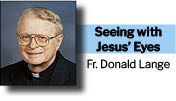
At my uncle’s funeral, before he began his homily, the priest removed his glasses. Then he laughed and stated, “Without my glasses, I see you indistinctly. When I wear my glasses, I can see your faces and your good looks!”
Spiritual glasses
Then he explained that his glasses were like faith. Without faith, we may find it difficult to see Christ in the world and others. But with faith, we can. Our spiritual glasses are our faith.
Lent is a season when we are invited to see the world and others with Jesus’ eyes and respond with Jesus’ love! Lent is a 40 day season of prayer, fasting, and almsgiving when we willingly choose a penance that will help us grow into more Christ-like persons.
The climax of Lent is when we celebrate the resurrection of Jesus and renew our Baptismal promises with renewed faith!
We began Lent by receiving a cross of ashes on our forehead, accompanied by the words, “Remember you are dust and unto dust, you shall return.” These words remind us of our body’s mortality and our soul’s immortality. Our body upon which we lavish so much attention will turn to dust. Our soul which we often neglect will live forever.
Alternate words that may accompany the distribution of ashes are “Repent and believe in the Gospel.” Jesus issued the same invitation to repent when he began his public ministry. Repentance means more than mere regrets for past actions. At its fullest, it means a fundamental change of direction or a 180 degree turn.
The ashes, an ancient symbol of cleansing, remind us of the need to cleanse our heart of sin and selfishness and make more room for Christ.
The second reading of the Ash Wednesday Mass reminds us that there is urgency about repentance. The time to repent is now. Tomorrow may be too late.
A call to do penance
The Ash Wednesday Mass’s first reading is a call to do penance. The Lenten rules for fasting and abstaining are that every person 14 years of age or older must abstain from meat (and items made with meat) on Ash Wednesday, Good Friday, and all Fridays of Lent. (See the Catholic Herald or parish bulletin for more information.)
During Lent we are also invited to choose a penance that helps us to grow as Christian persons. Three ancient penances for Lent are prayer, fasting, and almsgiving. When we fast, we identify with Jesus who fasted for forty days in the desert. Traditionally fasting is giving up certain foods and offering it up to God.
But we can also refrain from gossip, idleness, slander, backbiting, and other faults which hurt our ability to love.
Almsgiving reminds us that we have a responsibility to contribute to the support of the Church and clergy, feed the hungry, clothe the naked, and live the other corporal and spiritual works of mercy.
Prayer deepens our relationship with Jesus. We can pray, do spiritual reading, or participate in daily Mass. Penances that involve sacrifice and contribute to growth include Mass, Confession, praying the Rosary, or Eucharistic Adoration.
Other penances are listening to someone’s problems or being more fully present to family, friends, or others. The Holy Spirit can help us choose other penances.
Lent gives us opportunities to re-order our priorities. It invites us to examine our lives to see whether the good things of life have become idols or false gods. We can easily make food, drugs, money, fame, and self idols of pleasure.
Lent is a season of conversion when we willingly choose a penance to help us see more fully with Jesus’ eyes and respond with Christ-like love. The climax of Lent is when we renew our Baptismal promises by re-committing ourselves to dying to sin and rising to new life.
On Easter we join St. Paul who shouted, “O death, where is thy victory? O grave, where is thy sting?” For the Catholic who responds to God’s grace, life is not a dead end street with no exit but the door to Heaven.
In First Corinthians it says that Heaven is so fantastic that “eye has not seen, nor ear heard, nor has it entered into human hearts what God has prepared for those who love Him.”
Frank Sheed, an apologist, wrote that trying to fill our heart with some of the world’s junk food is like trying to satisfy our thirst by drinking salt water. The more we drink, the thirstier we get.
Recent popes have repeatedly reminded us Americans and others to repent of consumerism. This is the error of thinking that we can buy happiness by multiplying our possessions.
We also need to repent of hedonism which says, “If it feels good, do it!”
We can repent of selfishness that ignores the needs of the poor and oppressed and rationalizes that we can satisfy our obligation to them by gifts of charity from our surplus wealth with no examination of unjust structures that cause poverty and oppression.
Fr. Donald Lange is a Pastor emeritus in the Diocese of Madison.

